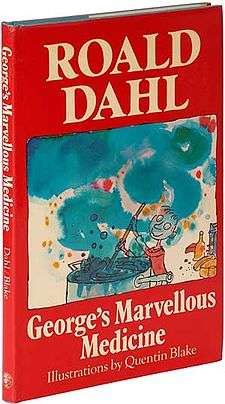George's Marvellous Medicine
 British first edition hardback | |
| Author | Roald Dahl |
|---|---|
| Illustrator | Quentin Blake |
| Country | United Kingdom |
| Language | English |
| Genre | Children's novel |
| Publisher |
Jonathan Cape (UK hardback) Alfred Knopf (US hardback) Puffin Books (paperback) |
Publication date | 1981 |
| Media type | Print (Hardback, Paperback) |
| Pages | 96 |
George's Marvellous Medicine (known as George's Marvelous Medicine in the US) is a book written by Roald Dahl and illustrated by Quentin Blake. First published in 1981, the book was praised for its imitativeness and humour, but was also criticised for its underdeveloped plot and somewhat abrupt ending. The book is one of Dahl's shorter children's books.
Being a medical expert was one of what Dahl called his “dreams of glory”: he had huge respect for doctors and particularly those who pioneered new treatments. Dahl dedicated George's Marvellous Medicine to “doctors everywhere”.[1] An audio reading of the book was released with the actor Richard E. Grant narrating.
Plot
While 8-year old George's parents, Mr and Mrs Kranky, are away running errands, his maternal grandma bosses him around and scares him by saying that she likes to eat insects and believes that she is a witch. George decides to make a magic medicine to replace his horrid grandma's old medicine. He goes around his home and collects a variety of ingredients including deodorant and shampoo from the bathroom, floor polish from the laundry room, horseradish sauce and gin from the kitchen, animal medicines, engine oil and anti-freeze from the garage and brown paint to mimic the colour of the original medicine.
After cooking the ingredients in the kitchen, George gives the medicine to his grandma, who briefly blows up into a large balloon, her belly catching fire. Then she grows as tall as the house, bursting through the ceilings and the roof. He then tests it on one of his father's chickens, which grows ten times its original size. Mr and Mrs Kranky return home and can't believe their eyes when they see the giant chicken and Grandma. George's mother drops the things she bought, while his father becomes very excited at the thought of giant animals. Then Mr Kranky has George use the medicine on the rest of the farm's animals, causing them to become giants as well. However, grandma begins complaining over being ignored and stuck in the roof of their house. Mr Kranky hires a crane to remove her from the house. Grandma's extreme height has her sleeping in the barn for the next few nights.
The following morning, Mr Kranky is still excited about George's medicine and announces that he and George shall make more medicine to sell to farmers around the world and create more giant animals, believing it will end world hunger. George attempts to recreate his medicine, but is unable to remember the ingredients. The second medicine makes a chicken grow long legs, and the third makes a chicken grow a long neck. The fourth medicine has the opposite effect of the first medicine and makes animals shrink. An angry Grandma then storms out of the barn, once again sick of being unappreciated. She then sees the cup of medicine that George was testing before and mistakes it for tea before snatching it out of George's hands, much to his and Mrs Kranky's horror and Mr Kranky's delight. She drinks the entire cup and ends up shrinking so much she vanishes, much to the despair of Mrs Kranky, who later accepts that her mother was becoming a nuisance anyway. George then reflects on the recent events and starts to think that, because of the magical medicines he created, he might be beginning to develop magic powers.
Safety concerns
A popular book for reading to children in primary school, great care was taken by teachers to warn children to not try and recreate the "medicine" at home due to the hazardous nature of some of its ingredients. There is a warning before the story stating "Warning to Readers: Do not try to make George's Marvellous Medicine yourselves at home. It could be dangerous."
Television version
Rik Mayall read this story for the BBC's Jackanory programme, in a widely acclaimed performance.
References
- ↑ "Roald Dahl on the death of his daughter" (3 February 2015). The Telegraph.